Kramatorsk: Life in Ukraine's romantic capital, 25 kilometres from the front
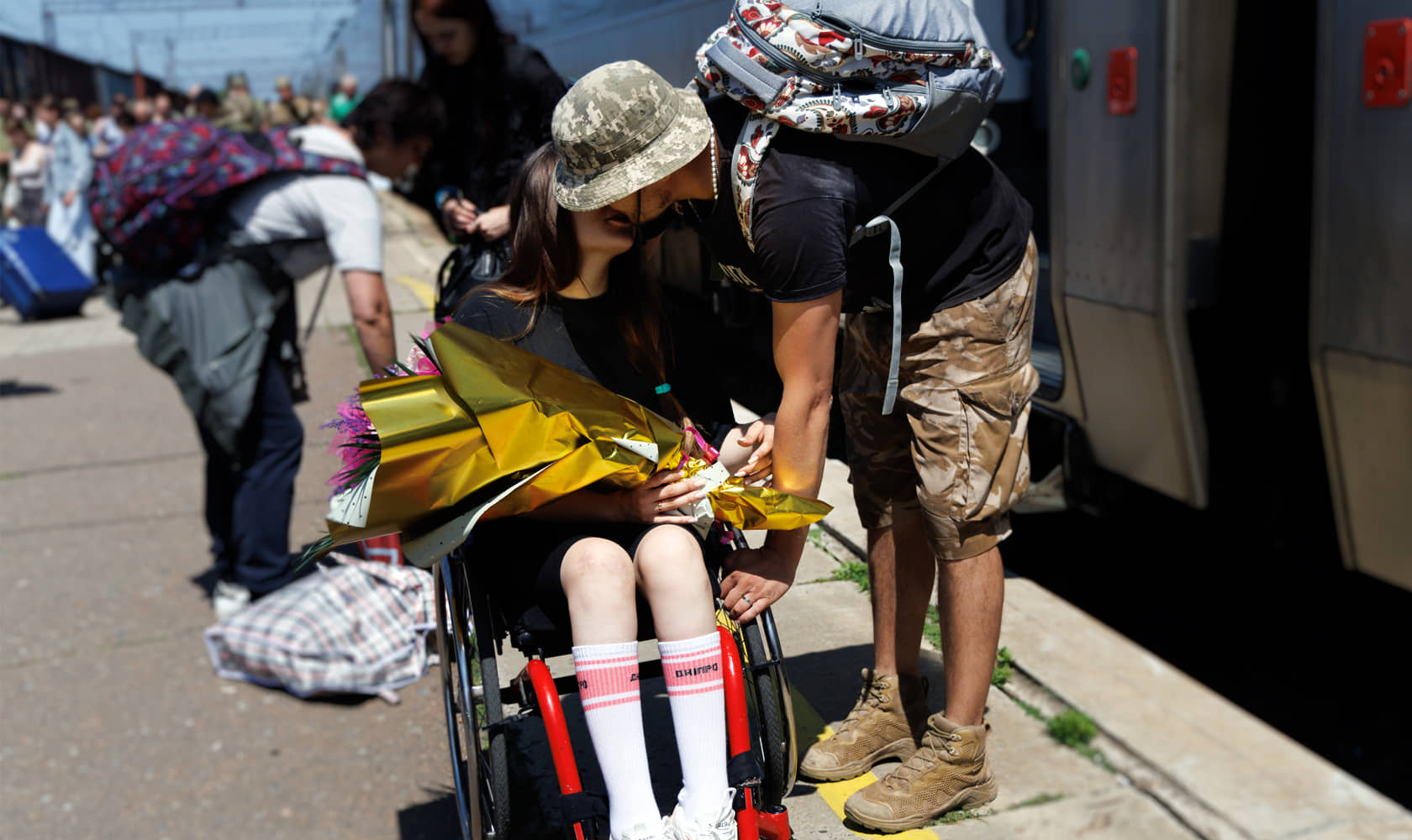
Kyiv-War.
That's the name of the train that leaves the capital every morning at 06:42 for Kramatorsk, the last stop before the front.
For the train's civilian passengers, it feels like the front, but for the military, comparing Kramatorsk with combat zones, it's the deep rear. That's how relativity works in Ukraine.
The sound of explosions often precedes the air-raid siren. It's difficult to detect S-300 missiles when they fly such short distances.
Despite air-raid warnings seven or eight times a day, Kramatorsk is a city of hedonism and love. Or more precisely – lust for life.
After spending several days or weeks in trenches, damp dugouts and basements, military personnel try and get away for at least a few hours in Kramatorsk.
It's a different world. You can order shisha in a restaurant, eat varenyky [Ukrainian dumplings – ed.], pizza, or pasta, or drink a gingerbread latte or a milkshake. Milkshakes are especially good when you're 25 kilometres from the front. But more importantly, it's good that they're there at all.
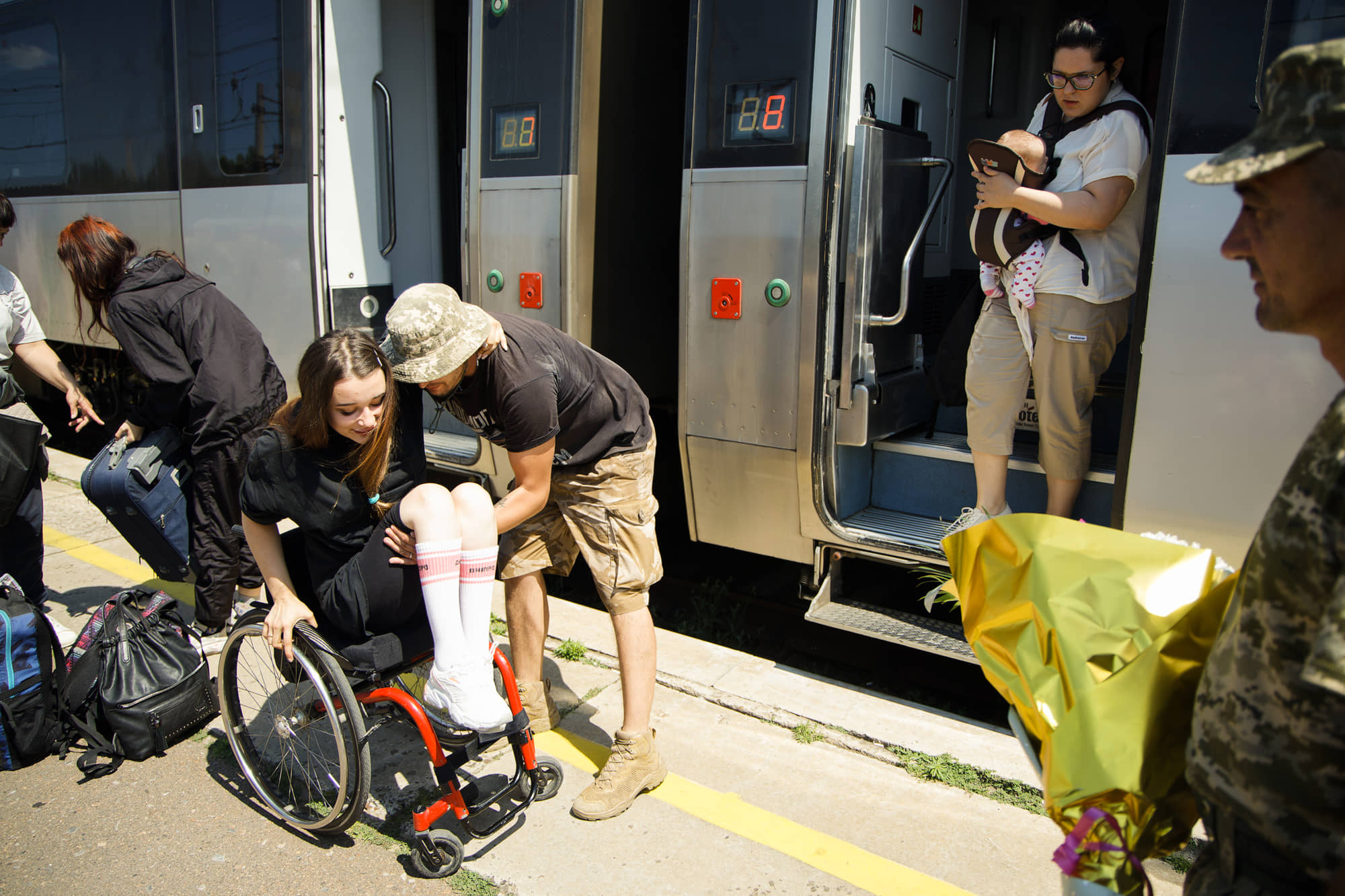
A tweet by a soldier, posted in spring, best describes the feeling of being in Kramatorsk, "Sex is good, of course, but have you ever tried spending a quiet night Kramatorsk after being under bombardment in Bakhmut?"
And what can you do on a quiet night in Kramatorsk? Drinking alcohol-free sparkling wine has become a popular choice, perhaps a response to the alcohol ban. Or perhaps because it reminds people of life before February 2022. It makes a good choice for a date with your loved one, arriving on the Kyiv-War train.
Like everywhere, Kramatorsk has a black market, where you can buy alcohol. Perhaps tomorrow, even nuclear weapons will be available on the black market. It's all a matter of time, which does not exist in Kramatorsk.
It's a city scattered with metaphors, hyperboles, and other nonsense, yet nobody notices or stops to read them. The central shopping centre is still called Arbat, with big green signs advertising the name [Arbat is a famous street in Moscow – ed.]. A few hundred metres away, on Myr Square, there is a metre-long hole carved by a missile – a greeting from the "Children of the Arbat" [a reference to Anatoly Rybakov's anti-Stalinist novel The Children of the Arbat – ed.].
Local pet stores always have long queues. The military feed all the cats and dogs that show up at their positions. Their four-legged friends need to eat, and the military needs something to care for.
Traffic lights have become obsolete. One in three military pickup trucks bypasses them, following their own set of personal driving rules and exceptions.
In Kramatorsk, as in every place during the war, we come across both the worst things in life and the best people. This article is about both.
Where do military personnel go to find peace after weeks or even months of fighting?
How does the city, now a borderland between the front and the deep rear, live?
What does the legendary Rick's Café from Casablanca have in common with Kramatorsk's Ria Pizza restaurant, destroyed by a Russian missile in June 2023, and where do all roads in Kramatorsk lead?
This article will aim to answer these questions.
Zhenia and Zhenia
Peace and war meet on the luggage racks of the Kyiv-Kramatorsk train. Military backpacks, multicoloured wheeled suitcases, checked granny shopping bags, ATB bags [a popular Ukrainian supermarket – ed.]. Everyone starts to feel like one entity, all following the same route, yet everyone has a different story.
Zhenia, who is 42-years-old, puts a box of cherries and strawberries on the shelf. In addition to her unusual luggage, she is distinguished by the traces of orange and blue paint marking her face. She spent the journey filling in a 'Paint by Numbers', recreating Van Gogh's Sunflowers.
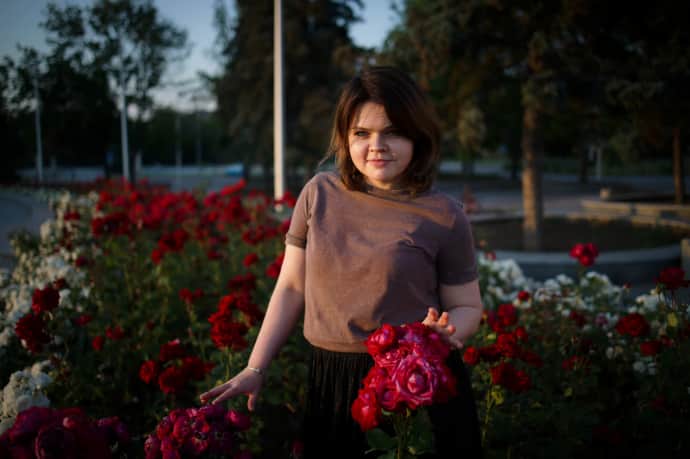
Zhenia is travelling to Kramatorsk from Germany to see her husband, for only the third time in almost a year and a half.
The Kramatorsk municipal workers finally convinced her that making the trip is safe. She saw in the news that they were planting oak trees, petunias, and geraniums in the city, with a combined worth of about a million hryvnias [about $27,000 – ed.].
"I thought, people are planting flowers there, why am I too scared to go?" she recalls.
Zhenia's husband can't visit his family abroad, even for a few days. He is also unable to take any vacation days during his wife's visit.
But even spending a few days in a rented apartment, close to her husband who is unable to leave his computer monitors, is enough for Zhenia.
"All this time we communicated via video, and we were silent most of the time," she says. "I cut vegetables to make vinaigrette salad, he clicks on his keyboard (this clicking really calms me), and then we exchange a couple of sentences."
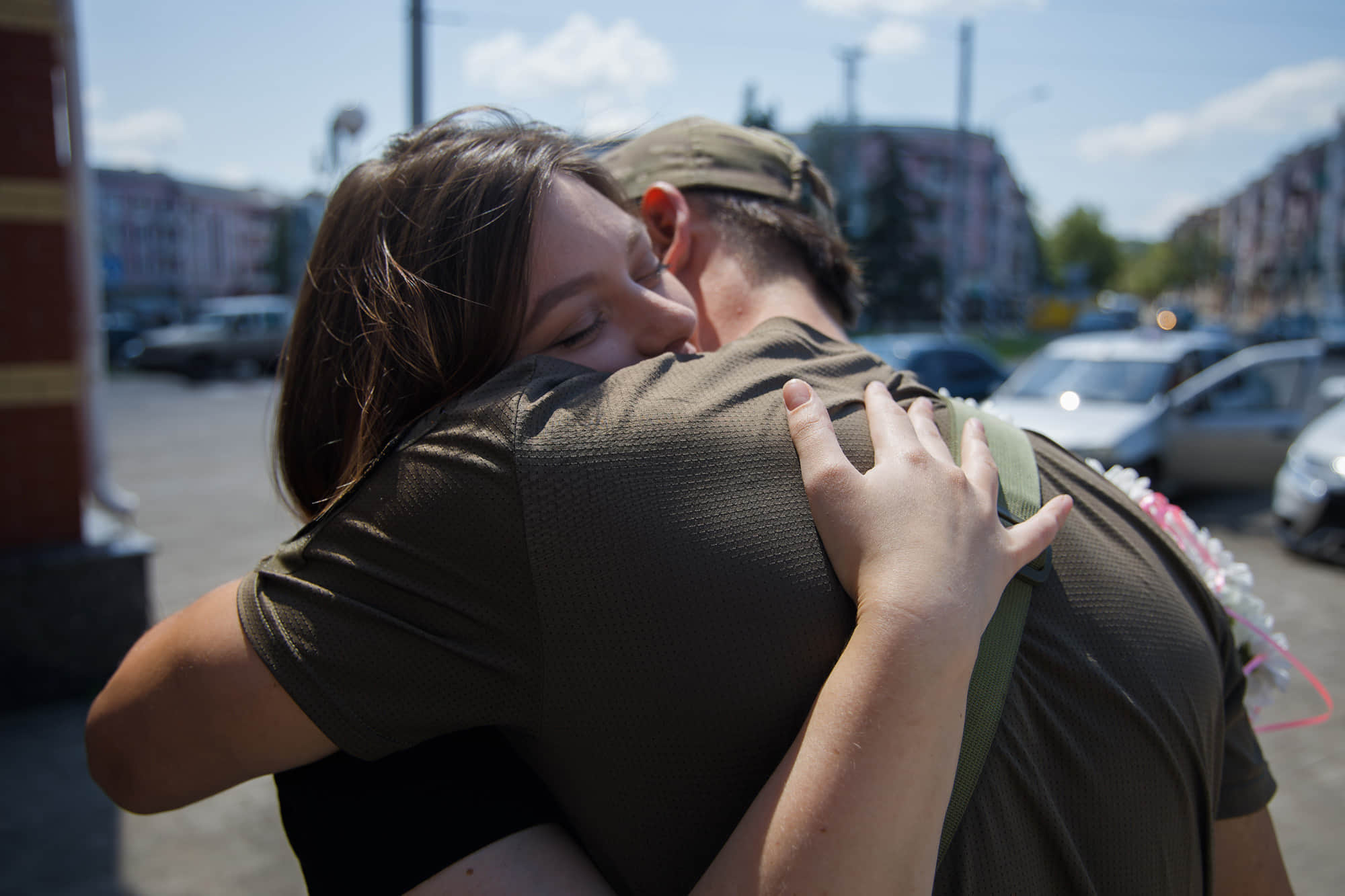
Western journalists like to call Kramatorsk "Ukraine's romantic capital" and take pictures of couples reuniting at the railway station
Zhenia met her husband, at the time a "pampered programmer" as she describes him, eight years ago on a dating site. They were finally married in Lviv during his ten-day vacation in the autumn of 2022.
Zhenia's husband is also called Zhenia [both shortened forms of popular Ukrainian names – ed.]. The day after his wife's arrival, we meet at his favourite coffee shop in Kramatorsk, N, where you can order a flat white and banana pudding.
After 24 February, pampered programmer Zhenia entered the ranks of Ukraine's Territorial Defence Forces, becoming a MANPADS operator, an analyst, and finally an intelligence officer. He took part in the fight for the Kyiv and Kharkiv oblasts, and now works here, in Donetsk Oblast.
Before this mission, he had never been to Ukraine's east and imagined it like something from the cyberpunk world – pipes, smoke, and people in gas masks.
"But it's cool here," says Zhenia. "It's the liveliest city I've been to in Ukraine."
"We even discussed the possibility of living here after the war," his wife adds.
In addition to flat whites and banana puddings, Zhenia considers the speed and quality of road repairs to be a sign of Kramatorsk's spirit. Local municipal workers repair them regardless of which way the front is moving.
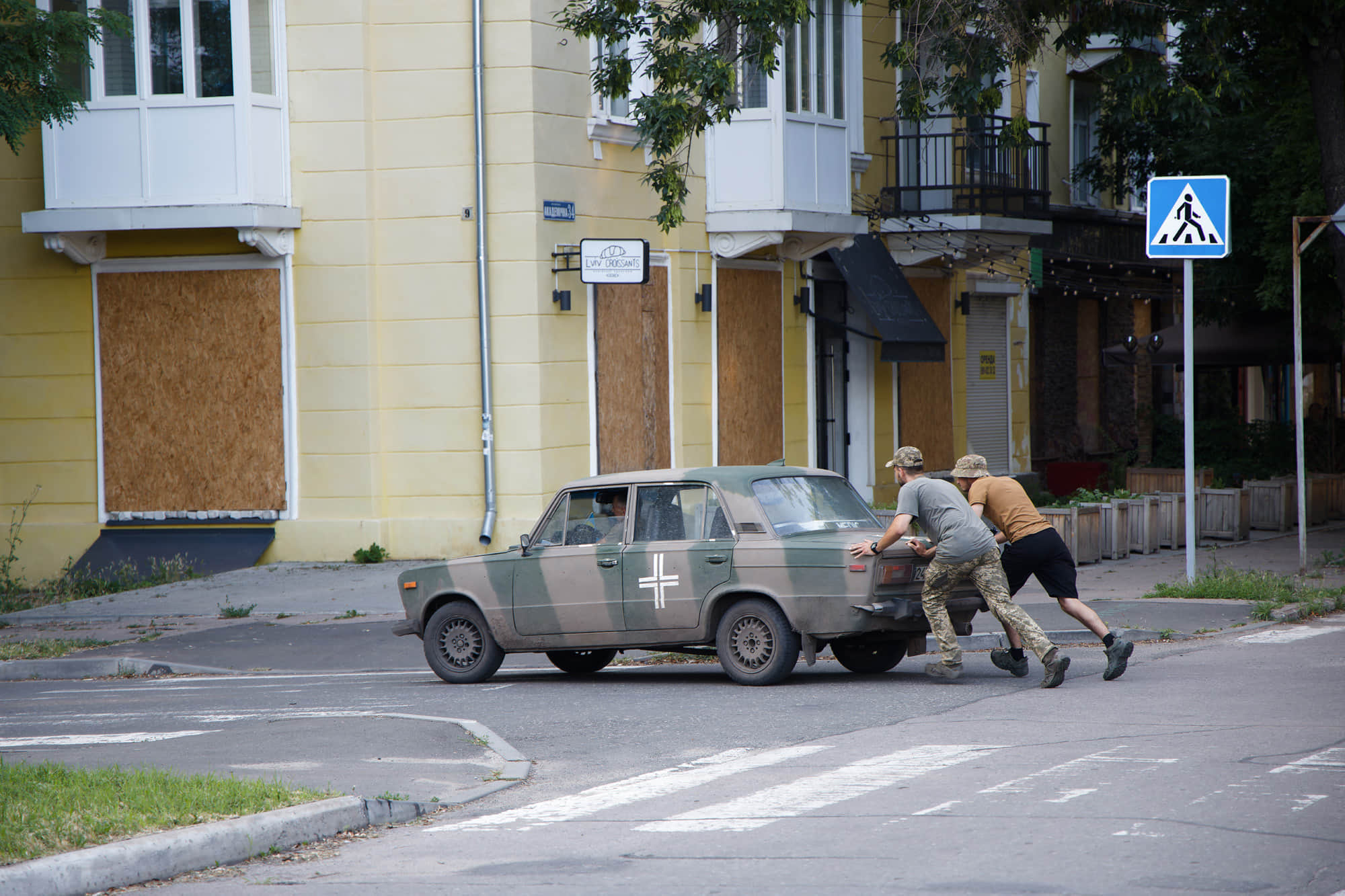
In Kramatorsk, Zhenia feels like the hero of Hemingway's novel A Farewell to Arms. He read the book in a trench in Kharkiv Oblast. He says the only thing to do there is read.
"The only difference is that no one drinks excessively in Kramatorsk," he clarifies. "That is to say, not like in Hemingway's novel. Although I find the pub culture described by Hemingway kind of beautiful, soulful even."
His list of favourite Kramatorsk locations includes Ria Pizza, but he knows this isn't an original choice. Everyone went there. It was impossible to live in Kramatorsk and not mention Ria.
During her four days in Kramatorsk, Zhenia did not finish painting all the numbers on Van Gogh's Sunflowers. Fortunately for her, she was busy with other things. Her husband found time for her, for them, despite the ongoing offensive around Bakhmut.
Kramatorsk is not just a lifeline for civilians, but for the military too.
A home you never get used to
Unlike Zhenia, who discovered Kramatorsk only after the full-scale invasion, for our other two protagonists, this city was, or eventually became, home.
23-year-old Artur, who currently serves as a combat medic, has an apartment here. He went to school in Kramatorsk, completing nine grades, and his grandmother lives here, along with her basement full of pickles and preserves.
Last summer, when the Russians were close to Sloviansk and Kramatorsk, she flatly refused to leave. She wanted to feed her grandson and his unit.
This shows how much faith she had in the Ukrainian Armed Forces.
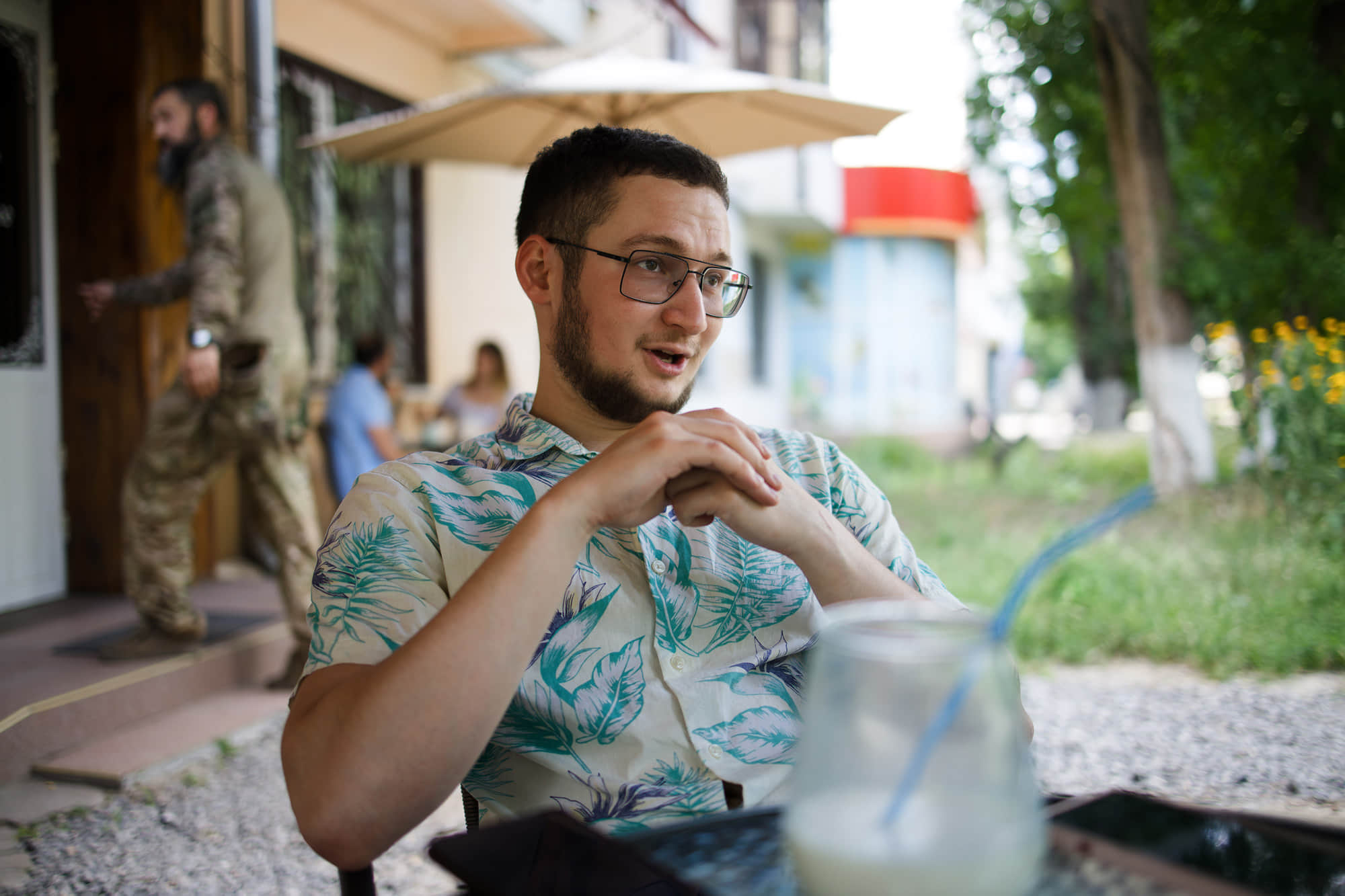
Artur arranges to meet us in the same coffee shop as Zhenia. He comes wearing civilian clothes – in this case a Hawaiian shirt – and orders himself a milkshake.
If it wasn't for the air-raid alert eight minutes into our conversation with Artur, the surrounding atmosphere would have resembled a peaceful afternoon in a seaside town.
Artur describes Kramatorsk in the early 2000s as a bright, hot, dusty city.
But by 2014 it would be better compared to an action movie. You would walk out onto your balcony and be greeted by the sight of tracer bullets, thanks to the nearby airfield.
After 2019, Kramatorsk was considered "cool". It had good roads, the central Peace Square was restored and there were thousands of students who had evacuated there from other universities in Donetsk.
On 24 February 2022, Kramatorsk became like any other Ukrainian city, with long queues of volunteers outside the military enlistment office. This was no longer 2014, when local Russian collaborators used to try and sabotage Ukrainian armoured personnel carriers.
"I think most people understood that if the Ukrainian military isn't here today, tomorrow the Russians will start stealing your toilets," says Artur.
Yet, he still doesn’t consider Kramatorsk to be a military city. He thinks, or chooses to believe, that it remains as it was before 24 February. Just with some new wounds.
One of those wounds is Ria. On 27 July, Artur left Ria 40 minutes before the missile struck. He had taken his medical backpack from the car and returned to help people.
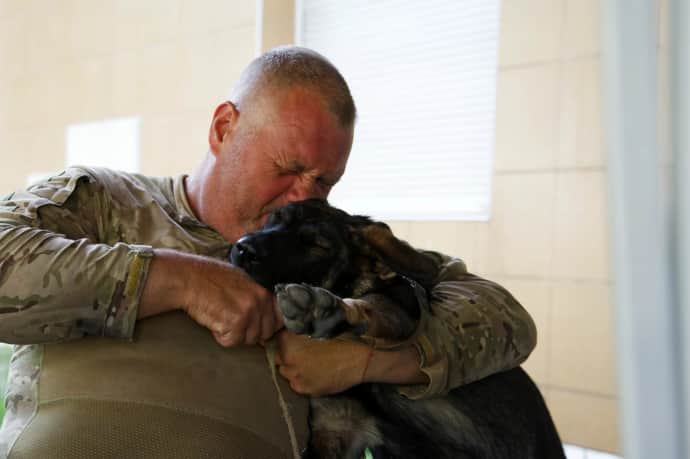
Oleksandr Mezin from the 93rd "Kholodny Yar" brigade would also have had dinner at Ria that day, if he hadn't needed to stay late at work.
Oleksandr was in Kramatorsk to get some respite. For 4G, the supermarket and for salmon pasta, which he orders when we arrive.
"You ask the commander if you can go to the city, and for a couple of hours, you can distance yourself from the war," explains Oleksandr. "I'm a civilian too!"
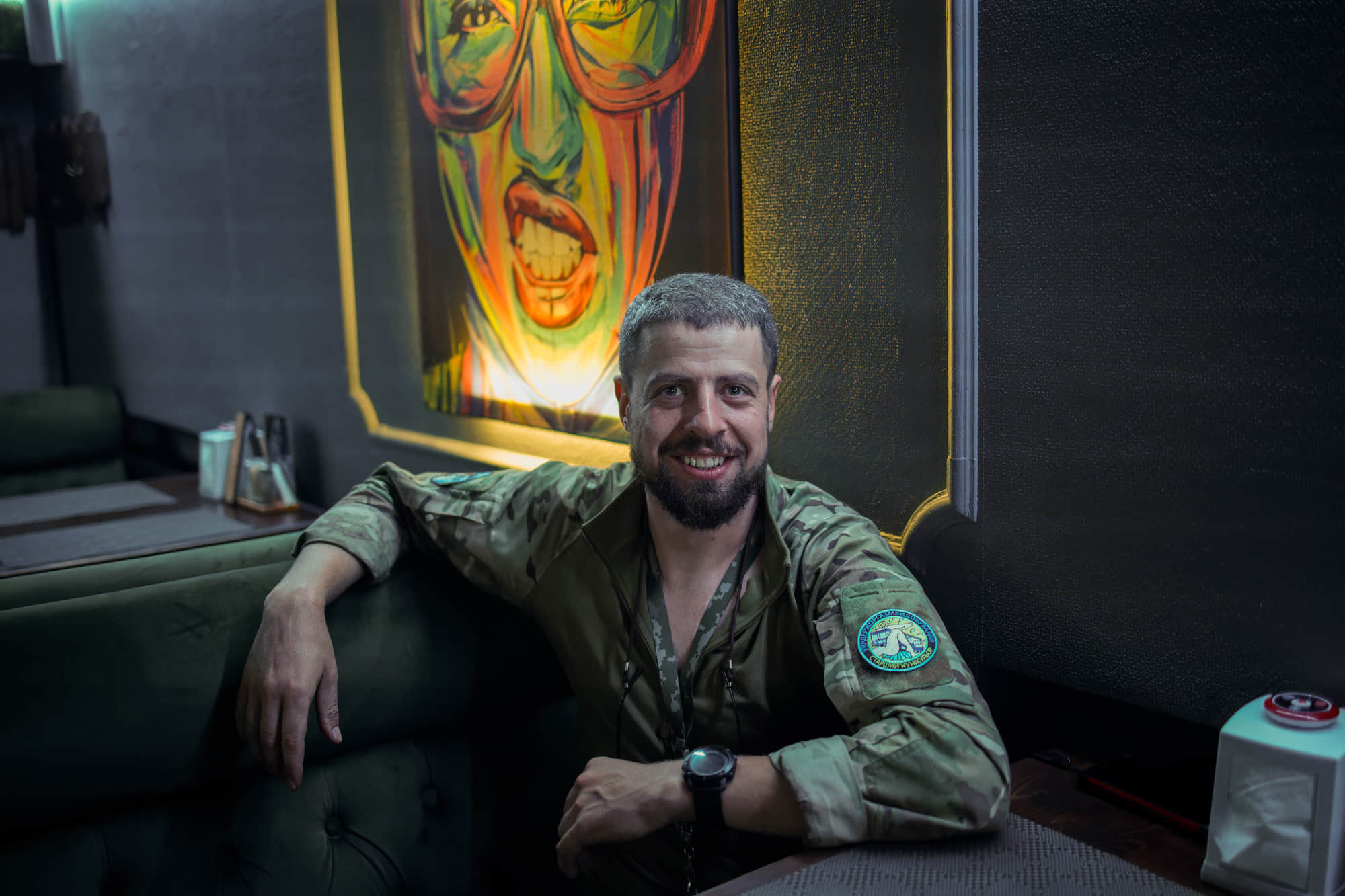
Oleksandr Mezin waiting for his salmon pasta to arrive in a restaurant in Kramatorsk. "Everything that happens in Kramatorsk stays in Kramatorsk," he jokes
Oleksandr hasn't been a real civilian for nine years. He went to war at 25; now he is 34. Every frontline city, if you ignore the dust and soldiers, smells like home to him.
However, a home to which you never get used to, because tomorrow, in a week or a month, you will be leaving it again.
Currently, the place he calls home is Druzhkivka, a city close to Kramatorsk.
"One of the original combat zone cities was Volnovakha; we called it Volnovegas," Oleksandr says. "It was such a small town that you would start walking, and before you knew it you were already outside it! Fifteen thousand people lived there before the war, and then 35 thousand soldiers came; can you imagine? A table in a café had to be reserved three days in advance."
He calls Kostiantynivka, which is now closest to the front, a 'Tortuga' – a place where 'pirates' spend looted money on "women, drugs and cars". His home of Druzhkivka in comparison is a sanatorium, where nothing happens.
"One of the few forms of entertainment in Druzhkivka is to go up the hill in the evening to see where the rockets fall," Oleksandr laughs.
On his personal rating system, he places Kramatorsk close to Volnovakha, because even in the worst times, there was water, electricity, supermarkets and girls on the streets. All that makes you a 'civilian', at least for a few hours.
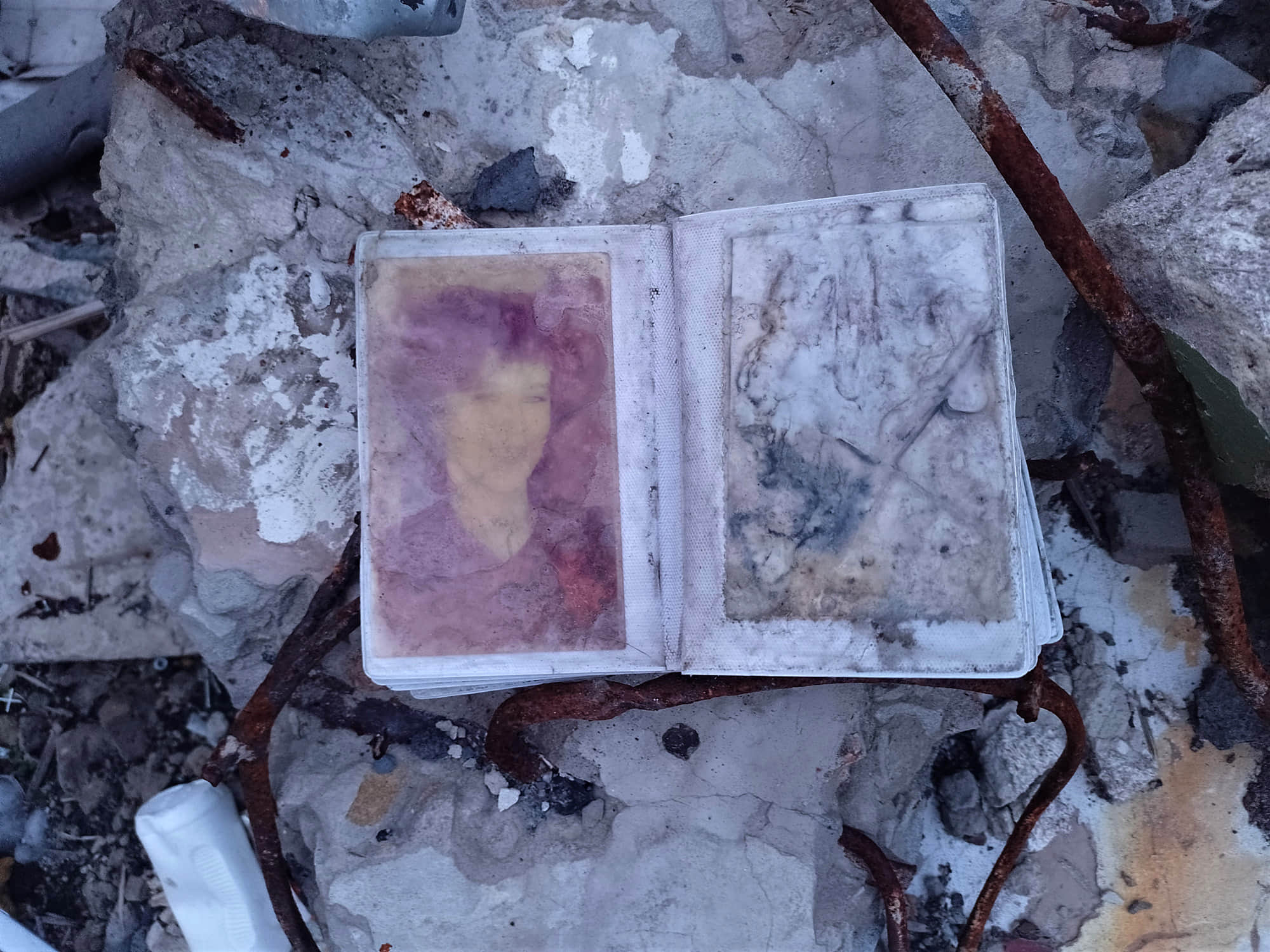
A photo album in the ruins of a four-story building in Kramatorsk which was hit by a Russian rocket on 1 February 2023
'Casablanca' in Kramatorsk
The main character of the Hollywood film Casablanca is the owner of Rick's Café. A noble cynic, courageous as a Marlborough cowboy, sad as the Count of Monte Cristo, and mysterious as Athos from The Three Musketeers.
His café is a place where people who are stuck between peace and war try to bring back a semblance of normality. They discuss news and grandiose life plans for the next three hours, eat, drink, flirt, quarrel and make deals.
Kramatorsk also has a place with a similar magic to it. Each of our protagonists are connected to it by something special.
For Zhenia, it was a place where he ate many lunches and dinners. Artur, the combat medic, once had his nose broken there.
After the strike by the Russian "Iskander" missile on 27 June, Ria Pizza was left in ruins, accompanied by a sign saying 'Closed'.
13 people died in the attack, including three children.
But the plates of cold food prepared for a dinner in the basement that night survived, now growing mould on the basement bar.
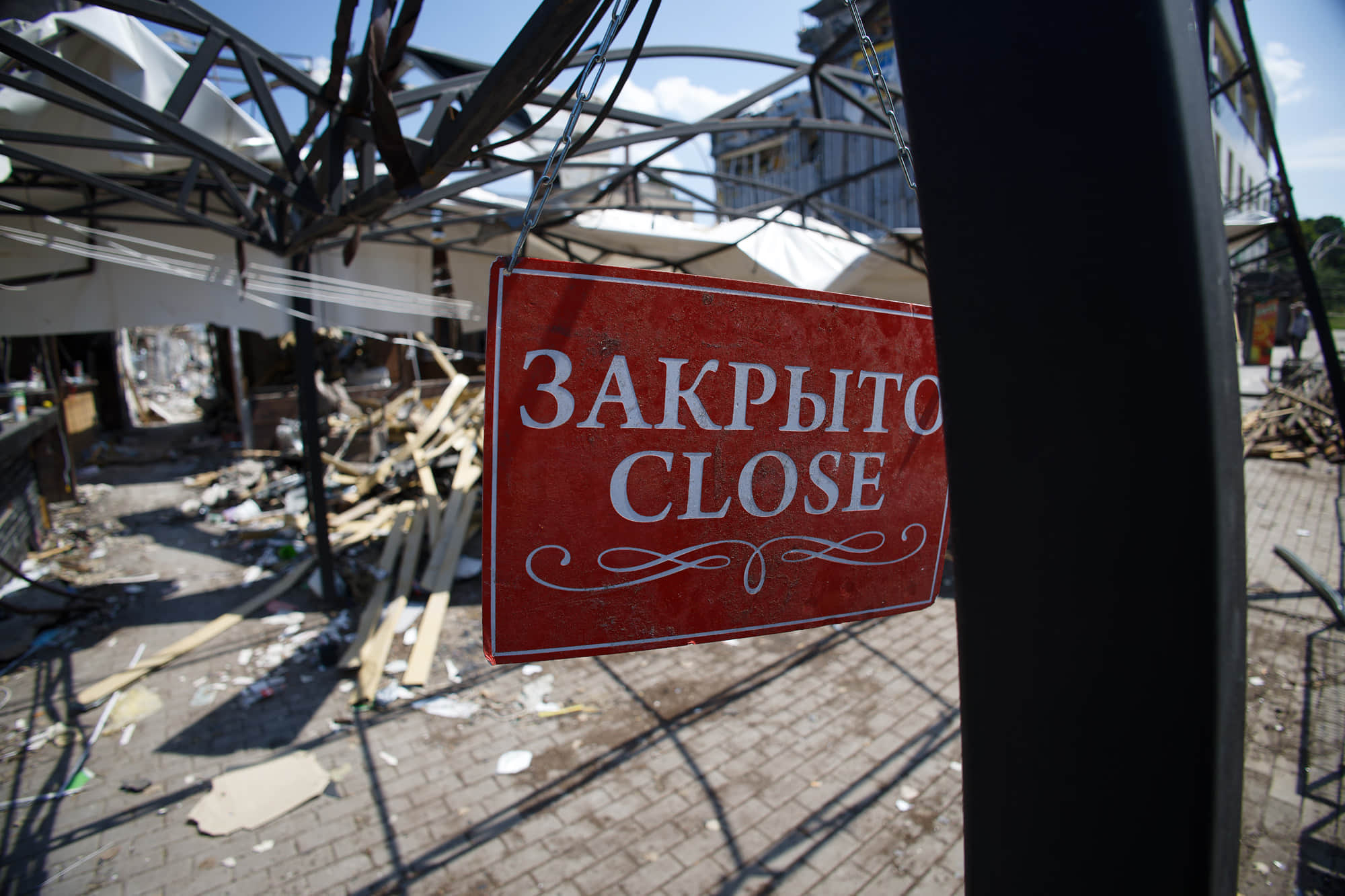
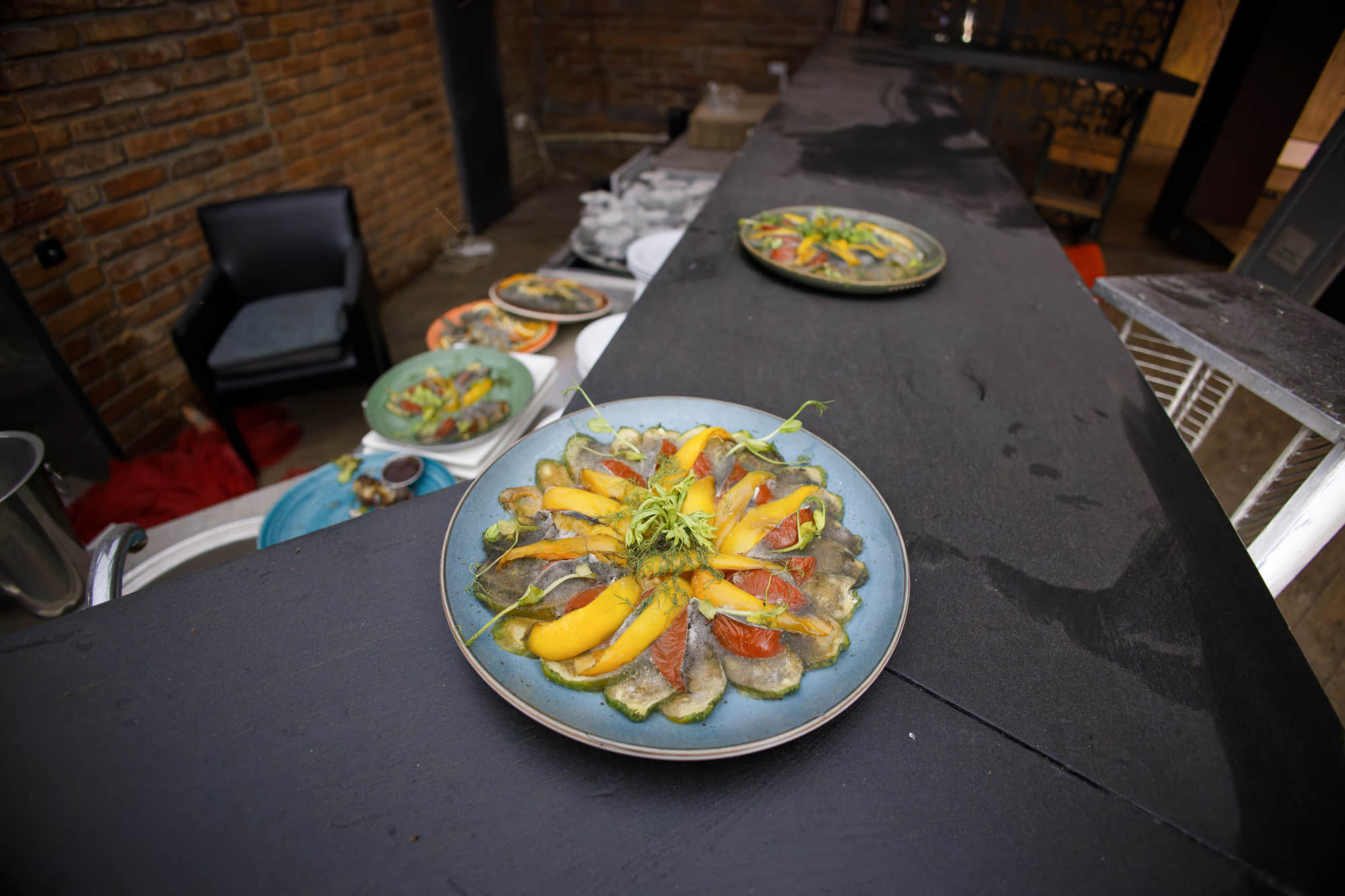
A car is parked in front of what remains of the restaurant. A grey-haired man sits inside and stares ahead of him, seemingly looking within himself rather than at any point outside. He looks the way a person might look between the fourth and fifth funeral of the day. He is one of the owners of Ria Pizza – 66-year-old Yurii Hut.
The last restaurant worker to die under the rubble that day was 24-year-old Zoriana Bakeeva.
"We entered the gate; there was a coffin," says Yurii. "Zoriana's father meets us. He said, 'Leave the tragic faces at the door. You may not understand, but just do as we ask. We will bury her body, but Zoriana is above us; she sees everything. So smile.' Zoriana's mother is nearby – she also remembers her daughter with a smile. This funeral made us all smile."
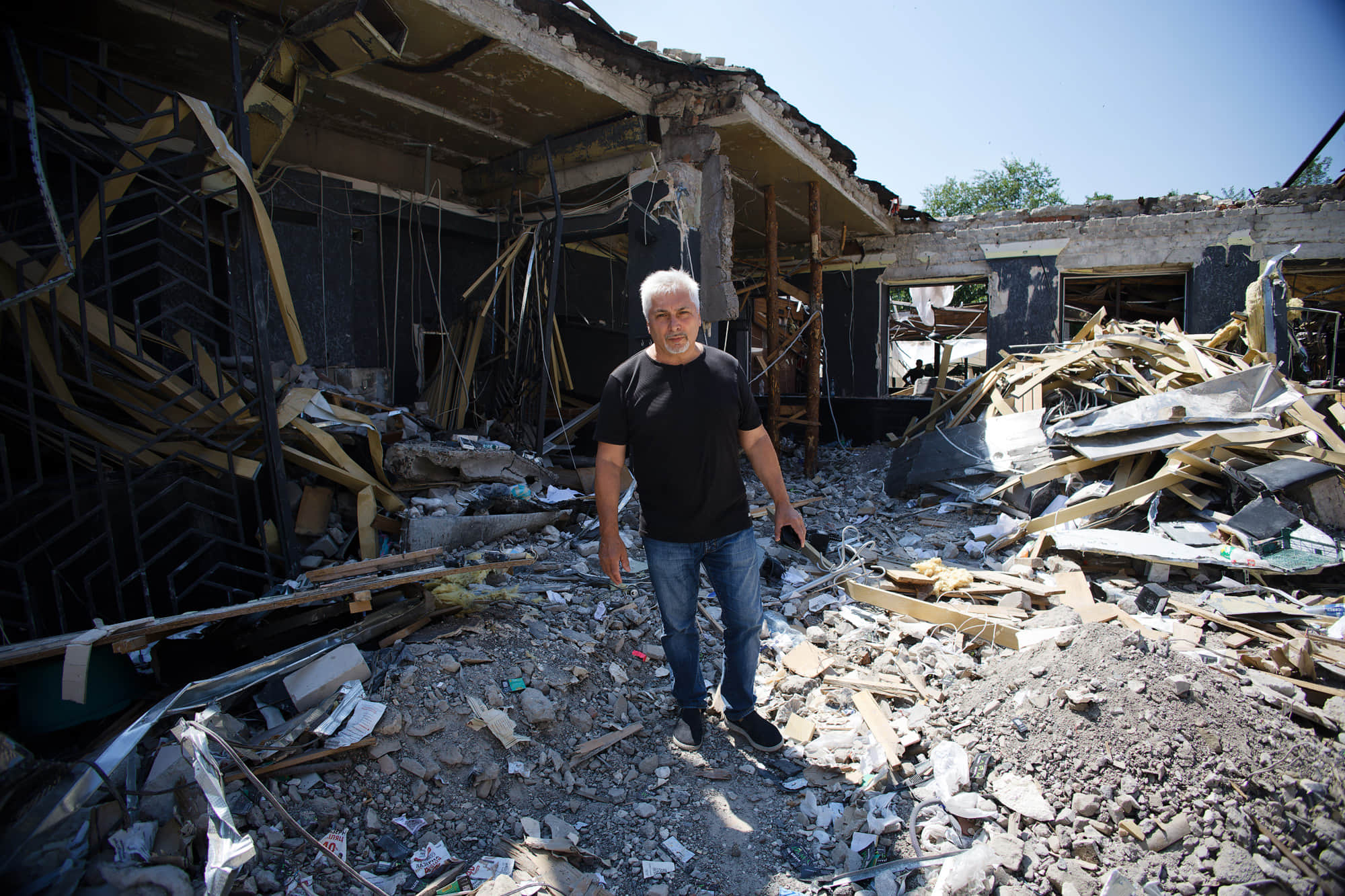
Almost 12 years ago, Ria Pizza appeared in Kramatorsk thanks to Yurii Hut's divorce. He needed somewhere to eat, and he decided that the best way to avoid a stomach ulcer was to open his own restaurant. They thought about the name for a long time until they came up with a word that came from 'pizzeria' itself – 'Ria'. They decided that it sounded beautiful, and being Latin added to its appeal.
A location in the centre of Kramatorsk was chosen for the restaurant, a place with a history. In Soviet times, it was the city's primary restaurant. To get in, you had to pay a bouncer.
The restaurant was opened a long time ago – in December 2011, two weeks before New Year.
"It was 20 degrees below zero outside. But we lit the fireplace, and people came to get warm. Then all the young people in the city started to come to our place."
They didn't come just for the delicious food, but also for somewhere cosy with a fire and free internet.
"One day I came in and saw three men still in their outerwear squatting by the fire. I approached them and said politely, 'Guys, you can't wear coats inside. And there's no need to squat, there are free tables'. They took off their coats and sat down. I looked and saw that there were three 'support groups' in the hall. They were poised for action. I begin to realise that they had planned a fight here.
The three men talked, ate, and got ready to leave. The first one approached me, shaking my hand and telling me his name, explaining that by law he’s a thief, and has just been released from prison. Thank you, he says, we'll come here again."
In one of the support groups was Ihor Shportiuk, known as Shkrok. He was a well-known criminal authority in the 90s, spending half his life in prison. After that memorable night, having avoided a fight, he came up to Yurii Hut and said, "Leonidovich, thank you, everyone enjoyed it so much."
Hut's experience of dealing with criminal authorities was useful in 2014. Kramatorsk was controlled by the DPR militants, and one day he received a call from the restaurant's administrator: "Yurii Leonidovych, I am about to be shot".
"Girkin was not there, but the rest of their ‘leaders' were sitting on the summer terrace. They ordered alcohol, but when they didn't get it they responded by grabbing their weapons. I said, 'You declared a prohibition law in the city!' ‘Who announced it?' they responded, ‘Let them re-announce that we can drink. It's hot, we need to cool off'. 'That won't happen' I replied. ‘Either everyone is allowed alcohol or no one is. And if you come here again with your weapons, you will find us closed'. Shortly after that, I went to Berdiansk and only returned when they had been expelled from Kramatorsk."
Eight years later, Yurii Hut was still hoping that a full-scale war would be avoided. Although everywhere there was evidence to the contrary.
Five days before 24 February 2022, he received a call from a waitress who warned him that a stranger had shown interest in him.
"I was watching the footage from the CCTV cameras, and a heavy built man in a raincoat comes in. Before talking to the waitress, he quickly pulls a surgical mask over his face, although no one was wearing masks any more."
Russian Sabotage and Reconnaissance Groups were everywhere. They were looking for well-known people in the city who they could persuade to cooperate. If they couldn't come to an agreement with you, they would kidnap a family member, and then you would do whatever they wanted.
The next morning, Hut took his wife and five-year-old son to Bukovel (a resort in the Carpathian mountains in the West of Ukraine). They spent two days skiing, and on the third day, the full-scale invasion began.
The restaurant continued to operate. It closed only after a Tochka-U missile hit the railway station on 8 April 2022. A few months later, they opened a restaurant under the same name in Kyiv near the Druzhba Narodiv (Friendship of the People; now Zvirynetska) metro station to provide their employees with a new job.
And in September, they returned to the city of Kramatorsk.
According to Yurii Hut, the biggest failure of his restaurant career happened a month before the Iskander missile strike.
The French ambassador, accompanied by local officials, had lunch at Ria Pizza. Among other things, we made pancakes. Meat pancakes, and sweet pancakes, which were supposed to be garnished with fresh raspberries and strawberries. But something went wrong, and the berries were put on the pancakes with the meat. The polite Frenchman did not show that he was surprised by the unusual Kramatorsk cuisine. Later, however, local officials began to quarrel with Hut, calling it a scandal. "How could you do that!".
"Our manager Artur tried to call someone to apologise," Hut recalls. "I told him, 'Calm down, don't stress. It happens. Everyone is nervous – this is a frontline city'."
Manager Artur Tytoruk, 28, died under the debris of Ria Pizza.
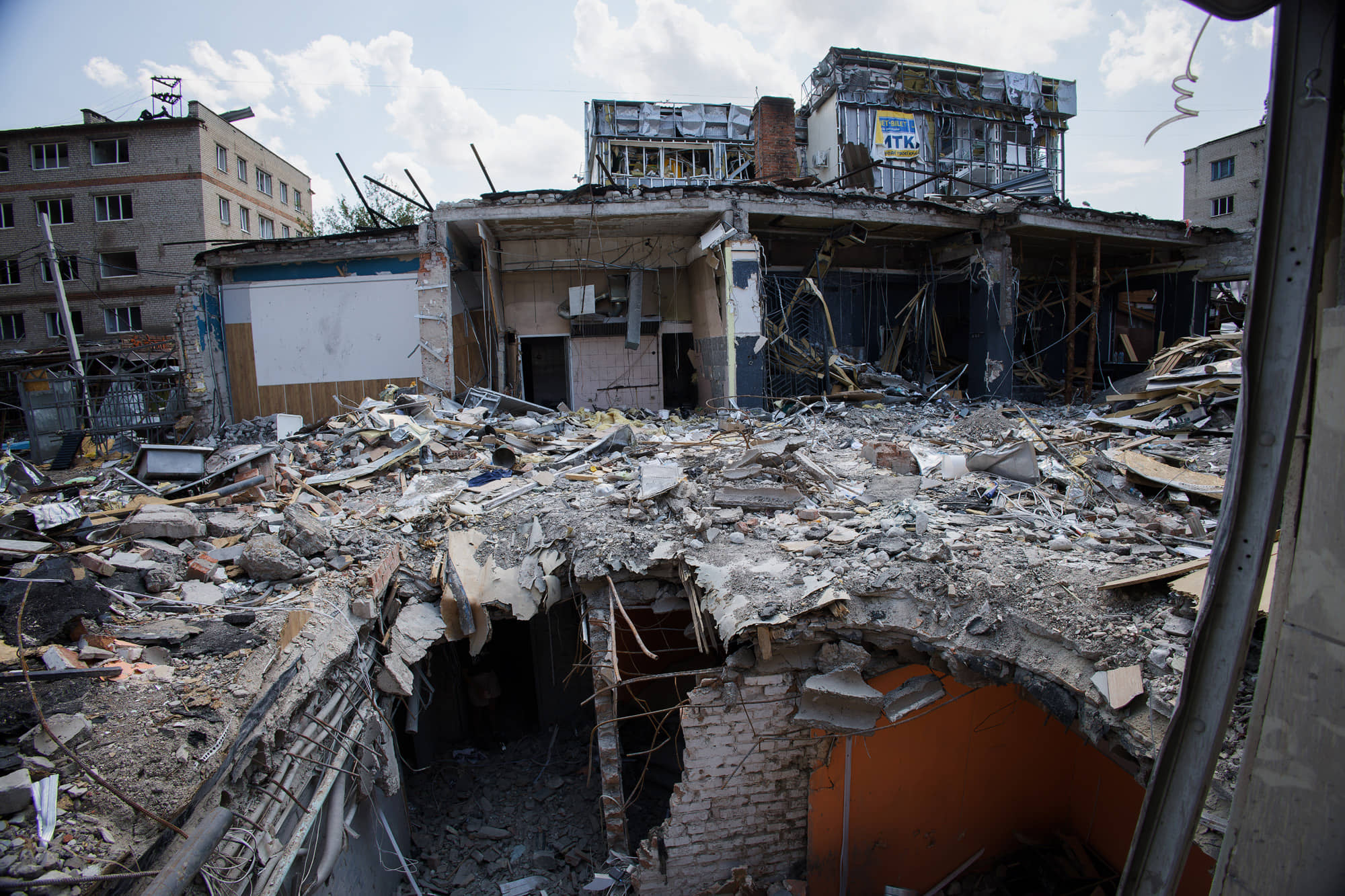
One of the character's in Hut's stories, the Kramatorsk criminal authority Shkrok, also died. After 24 February 2022, he wanted to serve in the Armed Forces, but the military enlistment office refused him because of his criminal record.
"I advised him to contact Mujahid, a former member of the Tornado battalion. He helped Ihor Shportiuk get to the front. I bought him ammunition, everything he needed."
On 21 November 2022, soldier Ihor Shportiuk was buried in Kramatorsk. He died near the village of Maksymivka in Mykolaiv Oblast.
"He was saving a wounded man, who survived, and Ihor was blown up by a mortar shot," says Hut.
In the name of state secrets
I swear, I will not count the dead
I won't count until I'm mad
And until the end of the war
(Actually, I started but I lost track)
These lines were written by Viktoria Amelina on 7 May 2022.
On 27 June 2023, she was in Ria Pizza during the missile strike and sustained a serious head injury. She died in hospital a few days later.
Fire, load, fire
The flower business, which is kept afloat by the Kyiv-War train, and the funeral business are feeling more confident than ever. The flowers are for dates, and there is a market for all funeral services.
There are three cemeteries in Kramatorsk. On the day of our visit, the friends and relatives of two defenders were saying their goodbyes at the burial site furthest from the centre, where the military are buried. 50-year-old Serhii Kozhanov and 28-year-old Denys Pavlov, who died in late June.
Two closed coffins. A small speaker protruding from the pocket of a National Guard member of the ceremonial unit plays the Ukrainian national anthem, followed by 'The Duckling Swims' (Plyve Kacha).
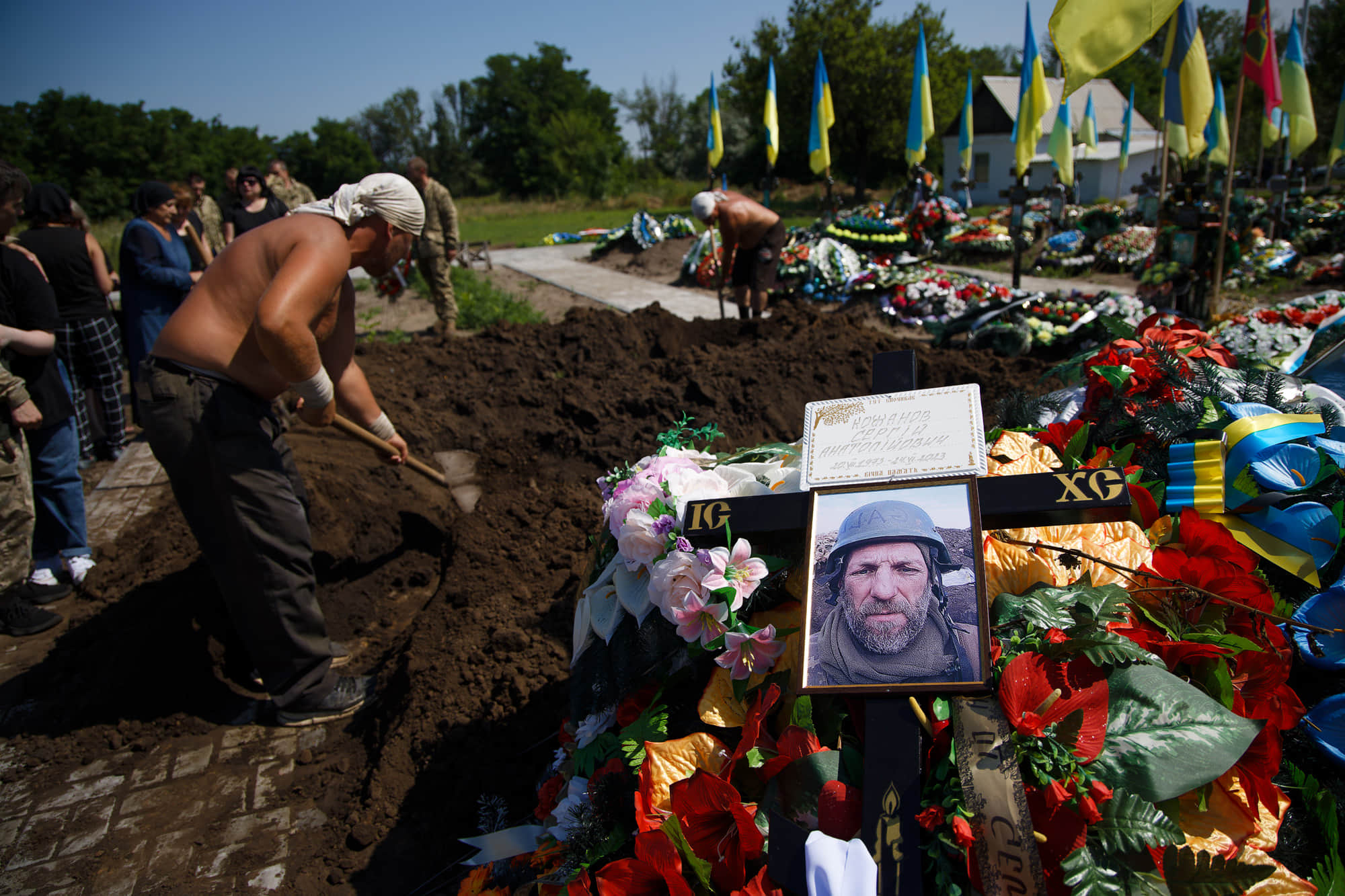
"'You don't need to be very intelligent to cry at gravesides,' someone wrote when the war became so familiar that people began to doubt whether it was still a war." (Yaryna Chornohuz)
One of Serhii Kozhanov's comrades-in-arms tells UP that at the beginning of the year their battalion was defeated near Avdiivka, and now they are fighting on the Bakhmut front.
"Serhii and I were together since the first few days of the war," he says. "He was a very kind person, always positive, even after he was wounded. It's hard. I'm sorry…"
Between the national anthem and 'The Duckling Swims' a few dozen words are read. "Bring the flag to the soldier Denys!", "Iryna Oleksandrivna, on behalf of the President, please accept the flag...", "Fire, load, fire".
After those final words, four National Guard members almost simultaneously fire their assault rifles into the air. Volleys of mourning. Bang, bang, bang.
No one around me is afraid of the gunfire, even the birds are used to it.
A warm wind is blowing in our faces. We do the most ridiculous thing we can do – walk between the rows of graves and count them. There are 11 per row. There are 4 full rows and 6 more in the last one, leaving half empty. In total, there are 48 graves, plus today's two that haven't been filled in yet, with mounds of soil around them.
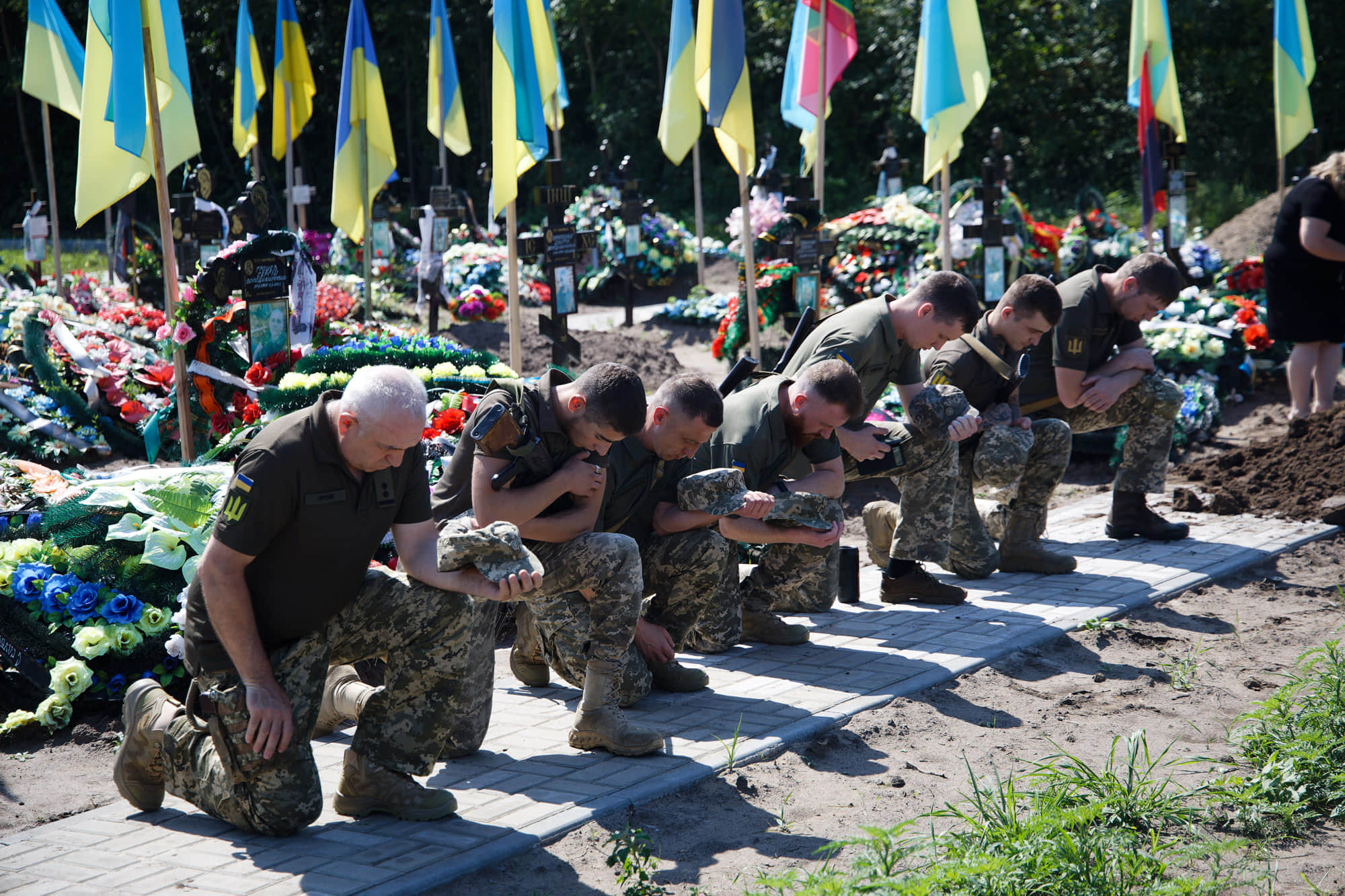
The priest is the first to throw several handfuls of earth into the fresh graves. The earth falls onto the coffins – one of the worst sounds in the world.
But if someone were to ask me to describe a military cemetery or an area for military burials, another sound would come to mind first – the rustling of satin flags flying over the graves.
State, brigade, UIA (Ukrainian Insurgent Army) flags – they rustle in every Ukrainian city.
Fifty graves. Fifty flags over them. Further, behind the newly covered graves, there is a field overgrown with weeds, which is quickly turning into a cemetery.
Death is conquering life metre by metre.
***
"Play it again, Sam!" is the most famous line from the film Casablanca. The pianist from Rick's Café is asked to repeat the melody that the characters have romantic memories of.
Vartan Vartanov, the 34-year-old frontman of the Kramatorsk-based band Quiz Music Band, had a lot of connections with Ria Pizza. He came there as a student. He proposed to his future wife there. He had been playing there almost every week since 2018. The last time was on 18.02.2022.
Musicians feel love through their ears. Vartan Vartanov recalls the sounds he associates with his hometown. When he was a child, it was the sounds of factories. Then the sound of fountains. Since 24 February last year – sirens.
We ask him to name a song that makes him think of Kramatorsk – the first song that comes to mind.
"Paradise City by Guns N' Roses" Vartanov replied instantly. "Don't ask why, I don't know."
But we don't need to ask, we already know the answer.
This is the refrain of Paradise City:
Take me down to the paradise city
Where the grass is green and the girls are pretty
Take me home.
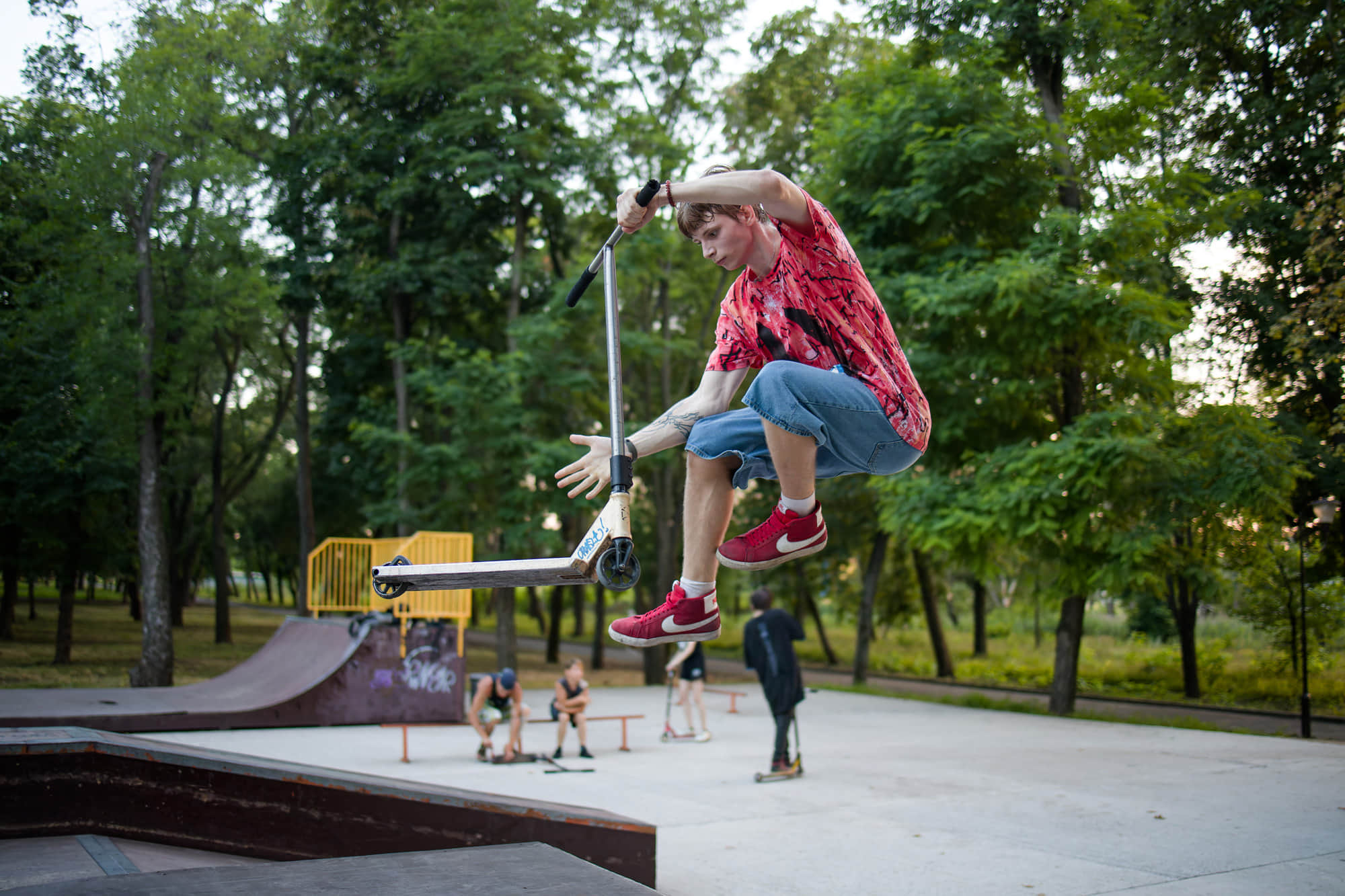
A few kilometres from the cemetery, where satin flags rustle over the graves, Kramatorsk's teenagers skateboard in the city park.
Zhenia and Zhenia quarrel and make up, remembering what normal married life is like.
Oleksandr orders pasta in a restaurant, so he can feel like a "civilian" for a few hours, but the restaurant is no longer Ria Pizza.
Sunflowers are blooming on the fields near Kramatorsk, no less beautiful than Van Gogh's.
The Kyiv-War train pulls in on 10 gauge tracks.
Kramatorsk's thirst for life is conquering death metre by meter.
Olha Kyrylenko, Mykhailo Kryhel, Dmytro Larin (photo) for Ukrainska Pravda
Translation: Tetiana Buchkovska, Yelyzaveta Khodatska, Violetta Yurkiv
Editing: Bea Barnes